Related Research Articles

General surgery is a surgical specialty that focuses on abdominal contents including the esophagus, stomach, small intestine, large intestine, liver, pancreas, gallbladder, appendix and bile ducts, and often the thyroid gland. They also deal with diseases involving the skin, breast, soft tissue, trauma, peripheral artery disease and hernias and perform endoscopic procedures such as gastroscopy and colonoscopy.
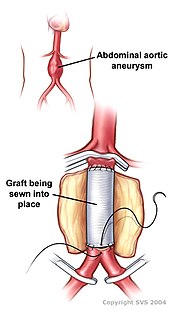
Vascular surgery is a surgical subspecialty in which diseases of the vascular system, or arteries, veins and lymphatic circulation, are managed by medical therapy, minimally-invasive catheter procedures and surgical reconstruction. The specialty evolved from general and cardiac surgery and includes treatment of the body's other major and essential veins and arteries. Open surgery techniques, as well as endovascular techniques are used to treat vascular diseases. The vascular surgeon is trained in the diagnosis and management of diseases affecting all parts of the vascular system excluding the coronaries and intracranial vasculature.
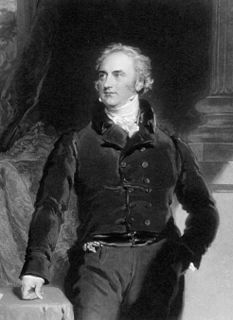
Sir Astley Paston Cooper, 1st Baronet was a British surgeon and anatomist, who made historical contributions to otology, vascular surgery, the anatomy and pathology of the mammary glands and testicles, and the pathology and surgery of hernia.
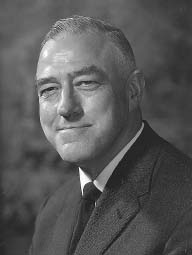
Sir Michael Francis Addison Woodruff, FRS, FRSE FRCS was an English surgeon and scientist principally remembered for his research into organ transplantation. Though born in London, Woodruff spent his youth in Australia, where he earned degrees in electrical engineering and medicine. Having completed his studies shortly after the outbreak of World War II, he joined the Australian Army Medical Corps, but was soon captured by Japanese forces and imprisoned in the Changi Prison Camp. While there, he devised an ingenious method of extracting nutrients from agricultural wastes to prevent malnutrition among his fellow POWs.
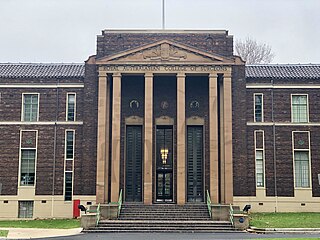
The Royal Australasian College of Surgeons (RACS) is the leading advocate for surgical standards, professionalism and surgical education in Australia and New Zealand.

In modern medicine, a surgeon is a physician who performs surgery. There are also surgeons in podiatry, dentistry, and veterinary medicine. It is estimated that surgeons perform over 300 million surgical procedures globally each year.

David G. Armstrong is an American podiatric surgeon and researcher most widely known for his work in amputation prevention, the diabetic foot, and wound healing. He and his frequent collaborators, Lawrence A. Lavery and Andrew J.M. Boulton, have together produced many key works in the taxonomy, classification and treatment of the diabetic foot. He is Professor of Surgery with Tenure and director of the Southwestern Academic Limb Salvage Alliance (SALSA) at the Keck School of Medicine of the University of Southern California and has produced more than 600 peer reviewed manuscripts and more than 100 book chapters.
Gerald Murray Lawrie, M.D. is an American heart surgeon and pioneer in the surgical treatment of valvular heart disease of Australian descent.
Sir Peter John Morris, AC, FRS, FMedSci, FRCP, FRCS is an emeritus Nuffield professor of surgery at the University of Oxford, former President of the Royal College of Surgeons of England, founder of the Oxford Transplant Centre and director of the Centre for Evidence in Transplantation at the Royal College of Surgeons of England.
Trauma surgery is a surgical specialty that utilizes both operative and non-operative management to treat traumatic injuries, typically in an acute setting. Trauma surgeons generally complete residency training in General Surgery and often fellowship training in trauma or surgical critical care. The trauma surgeon is responsible for initially resuscitating and stabilizing and later evaluating and managing the patient. The attending trauma surgeon also leads the trauma team, which typically includes nurses and support staff as well as resident physicians in teaching hospitals.
The Nork-Marash Medical Center is a teaching hospital and biomedical research facility in Yerevan, Armenia, focused on cardiac care. It is led by Dr. Hrayr (Hagop) Hovagimian, a Syrian-Armenian cardiothoracic surgeon from the University of Aleppo and St. Vincent's Hospital, Portland.
Peter Allen was a Canadian surgeon who played a leading role in improving cardiac surgery techniques. Along with Dr. Philip Ashmore, Dr. W.G. (Bill) Trapp and Dr. Ross Robertson, he performed the first Open Heart Surgery in British Columbia on 29 October 1957 at Vancouver General Hospital, by closing an Atrial Septal Defect (ASD) in 9 year old John Evans, using Cardiopulmonary Bypass (CPB).

George Hogarth Pringle was a Scottish-Australian surgeon. He qualified in medicine from Edinburgh, Scotland and then worked in the Royal Infirmary of Edinburgh along with the young Joseph Lister with whom he continued to correspond. He settled in Parramatta, New South Wales, Australia and is credited with introducing Listerian antisepsis into Australia.
Ned Abraham was an Associate Professor of surgery at the Faculty of Medicine, University of New South Wales and is a general & colorectal surgeon, a clinical academic and a retired Australian Army Reserve Officer. He has spoken at multiple national and international meetings in four continents and his published articles in general, colorectal and academic surgery have been cited in the medical literature over a thousand times. He continues to practice surgery in Coffs Harbour, NSW, Australia.

Sivapatham Vittal is an Indian surgical endocrinologist, considered by many as the Father of Surgical Endocrinology in India. The Government of India honored Vittal in 2011, with the fourth highest civilian award of Padma Shri.
Victor Warren Fazio AO,, an Australian, was a colorectal surgeon, a leader at the Cleveland Clinic, Ohio for over 35 years. He pioneered surgical techniques and improved the quality of life for cancer patients around the world. He wrote or co-authored 13 books, contributed scientific papers to standard texts, lectured and taught younger surgeons in the United States and Australia.
Darab Jehangir Jussawala (1915–1999) was an Indian medical-cum-surgical oncologist, medical writer and the director of Tata Memorial Centre. He was the co-founder of Indian Cancer Society, along with Naval Tata in 1951, and the founder of the Indian Cancer Rehabilitation Centre in Parel, Mumbai, in 1956, the first such centre in India and the largest in Asia. He served as the director of Lady Ratan Tata Medical and Research Center and as the honorary consultant at two Mumbai hospitals, Breach Candy Hospital and Jaslok Hospital. An elected fellow of the Royal Society of Medicine, National Academy of Medical Sciences, Indian Academy of Sciences, Indian National Science Academy and the American College of Surgeons, he was a recipient of the Dhanwantari Award as well as several Oration Awards. The Government of India awarded him the third highest civilian honour of the Padma Bhushan, in 1975, for his contributions to Medicine.
Maurice Rossie Ewing, CBE, FRCSEd, FRCS, FRACS was a Scottish surgeon who was the first professor of surgery at the University of Melbourne, Australia. His department established an early programme of renal transplantation in Australia.
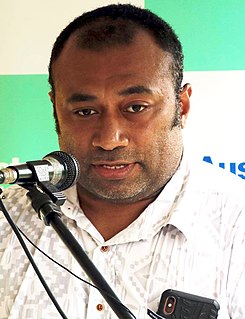
Dr. Ifereimi Waqainabete is a Fijian politician and Member of the Parliament of Fiji who is the current Minister for Health and Medical Services in the FijiFirst government. Before entering politics Dr Waqainabete was a general surgeon in Fiji and Associate Professor of General Surgery at Fiji National University, former President of the Fiji Medical Association, President of the Pacific Island Surgeons Association, and former Chairman of Fiji Medicinal Board. He was on leave from his academic and surgical duties to partake in the 2018 elections as a candidate for the Fiji First Party.

Charles Granville Rob was a British surgeon who pioneered techniques in the repair of damaged blood vessels, particularly the operation to unblock arteries of the neck, known as carotid endarterectomy and of the aorta when treating aortic aneurysms.
References
- ↑ "Archived copy". www.sydneyendovascular.com.au. Archived from the original on 9 April 2013. Retrieved 14 January 2022.CS1 maint: archived copy as title (link)
- ↑ "RACS" (PDF). Surgeons.org. Retrieved 2020-01-03.